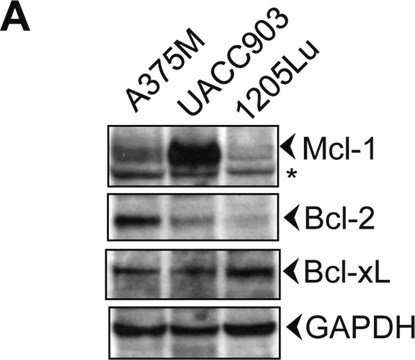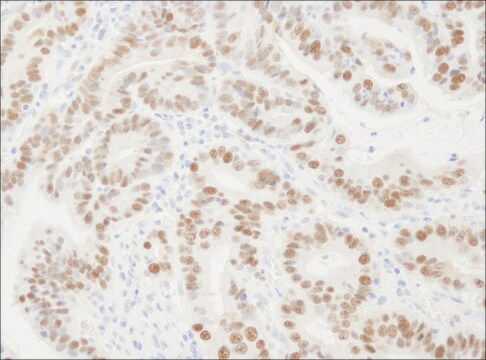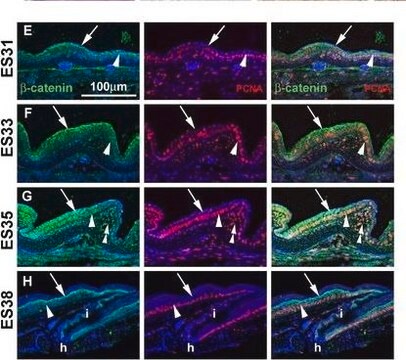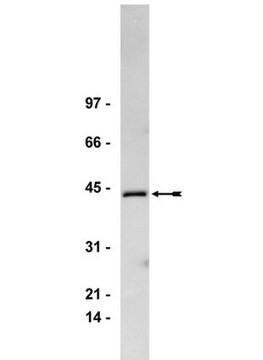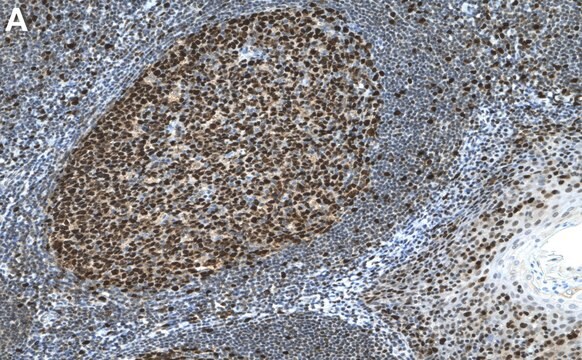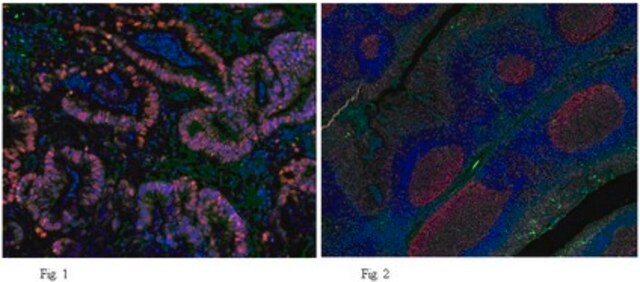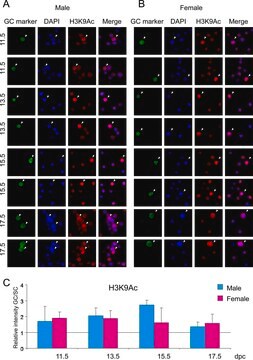MAB424
Anti-PCNA Antibody, clone PC10
clone PC10, Chemicon®, from mouse
Synonim(y):
Proliferating Cell Nuclear Antigen, DNA Polymerase delta Processivity Factor
About This Item
Polecane produkty
pochodzenie biologiczne
mouse
Poziom jakości
forma przeciwciała
purified immunoglobulin
rodzaj przeciwciała
primary antibodies
klon
PC10, monoclonal
reaktywność gatunkowa
vertebrates, invertebrates
opakowanie
antibody small pack of 25 μg
producent / nazwa handlowa
Chemicon®
metody
ELISA: suitable
flow cytometry: suitable
immunohistochemistry: suitable (paraffin)
immunoprecipitation (IP): suitable
western blot: suitable
izotyp
IgG2a
numer dostępu NCBI
numer dostępu UniProt
Warunki transportu
ambient
temp. przechowywania
2-8°C
docelowa modyfikacja potranslacyjna
unmodified
informacje o genach
human ... PCNA(5111)
Powiązane kategorie
Opis ogólny
Specyficzność
Immunogen
Zastosowanie
Epigenetics & Nuclear Function
Cell Cycle, DNA Replication & Repair
Immunohistochemistry: 1:20-1:200. Recommended for paraffin embedded tissue sections only. May be used on material fixed in a wide range of fixatives including formalin (buffered and unbuffered), methacarn and Bouin′s reagent. The time of fixation can markedly affect the intensity of PCNA immunoreactivity. Staining is reduced (and may be abolished) if sections are baked onto glass slides. Air-drying overnight on poly-L-lysine coated slides is recommended. 60 minute incubation at 25°C with standard ABC technique is recommended.
Immunoprecipitation
Indirect Flow Cytometry
Optimal working dilutions must be determined by the end user.
Jakość
Opis wartości docelowych
Postać fizyczna
Przechowywanie i stabilność
Komentarz do analizy
Rat kidney, Human tonsil, lymph node tissue
Inne uwagi
Informacje prawne
Oświadczenie o zrzeczeniu się odpowiedzialności
Nie możesz znaleźć właściwego produktu?
Wypróbuj nasz Narzędzie selektora produktów.
Kod klasy składowania
10 - Combustible liquids
Klasa zagrożenia wodnego (WGK)
WGK 2
Temperatura zapłonu (°F)
Not applicable
Temperatura zapłonu (°C)
Not applicable
Certyfikaty analizy (CoA)
Poszukaj Certyfikaty analizy (CoA), wpisując numer partii/serii produktów. Numery serii i partii można znaleźć na etykiecie produktu po słowach „seria” lub „partia”.
Masz już ten produkt?
Dokumenty związane z niedawno zakupionymi produktami zostały zamieszczone w Bibliotece dokumentów.
Nasz zespół naukowców ma doświadczenie we wszystkich obszarach badań, w tym w naukach przyrodniczych, materiałoznawstwie, syntezie chemicznej, chromatografii, analityce i wielu innych dziedzinach.
Skontaktuj się z zespołem ds. pomocy technicznej
